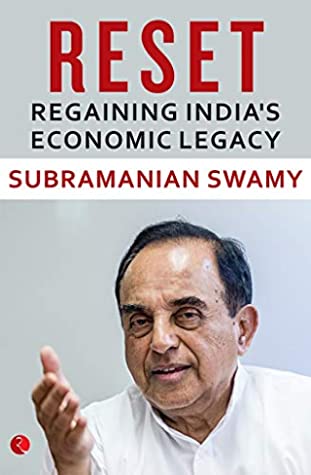RESET: Regaining India’s Economic Legacy by Subramanian Swamy - Review by Abhishek Desikan
Subramanian Swamy’s latest book is as firebrand as the man himself, where he deals with one of the most discussed topics today - India’s economic struggles and the way forward.
The book looks at India’s economy in three stages - Pre-independence, post-Independence till liberalization, and post-liberalization India.
Being the analytical mind that he is, Swamy starts by setting the historical context accurately. He rightly attributes India missing the industrialization bus to the systematic bleeding of resources and the blocking of native innovation by the Britishers. Although it’s a well-established fact now, it still gives the reader the right mental framework in thinking about the progress of India’s economy in spite of such dire circumstances.
Second, he speaks about the inexcusable adoption of the Soviet-style command economy by Nehru and subsequent governments, which led to India missing the globalization wave. India had a GDP growth of a mere 4% for close to 40 years post Independence. In comparison, countries with far lesser resources like Singapore and South Korea were able to progress rapidly with a GDP growth of more than 10% every year.
Swamy speaks of his contributions in providing the Swadeshi framework for the Chandra Shekhar government, and later the Rao government. The adoption of his ideas led India from the lows of the balance of payment crisis to consistently hitting over 7% GPD growth during the 90s.
We then fast forward to the present, where Swamy paints a dire picture of the state of the economy, in what he terms as a ‘tailspin.’ A consistent lack of investment in agriculture, mismanagement of resources, demonetization, GST, lack of innovation, and policymakers who don’t understand macroeconomics are cited as the main reasons for the current state of the economy.
He, however, does not consider it a point of no return. Swamy proposes various measures that can be enacted to get India back on track to over 10% GDP growth every year. A few non-obvious ones which resonated with me are the creation of new cities and the 7 postulates proposed by Deendayalji, which focus on ‘Integral Humanism’ and adherence to Indian ethos. Compared to other ideologies like socialism, communism, and capitalism, which are materialistic, Integral Humanism focuses on the growth of humanity in harmony with their surroundings.
It is this approach that can translate our goals into actionable policies, and it requires the right vision and expertise in Economics to do that.

Originally published here.